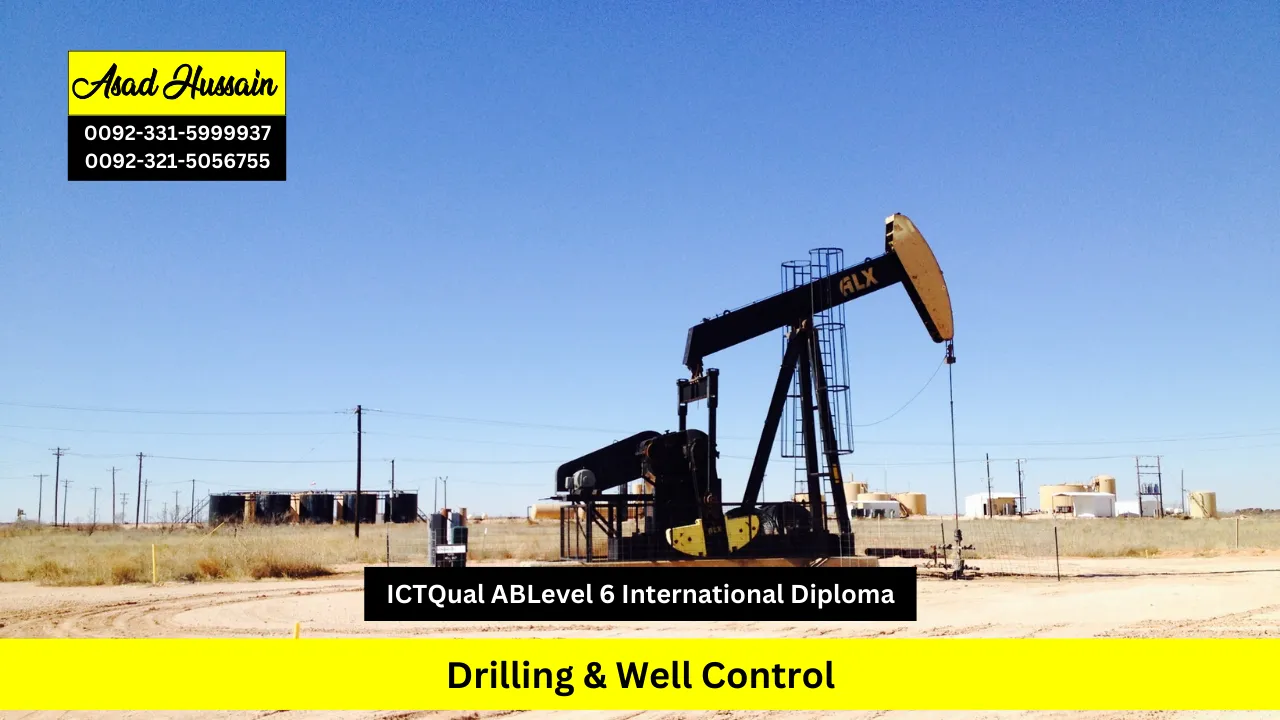Drilling and well control are at the heart of the oil and gas industry, playing a crucial role in ensuring safe, efficient, and cost-effective energy production. The ICTQual AB Level 6 International Diploma in Drilling & Well Control has been specifically designed to provide learners with the advanced technical knowledge, problem-solving skills, and practical expertise required to manage complex drilling operations in line with global industry standards.
ICTQual ABLevel 6 International Diploma in Drilling & Well Control explores critical topics such as well design, drilling fluids, casing and cementing, blowout prevention, pressure control, and safety management systems. Learners will also gain exposure to digital tools and simulation technologies, equipping them to handle real-world challenges with confidence and precision.
The course blends theoretical instruction with applied case studies and project-based learning, ensuring that graduates are not only technically proficient but also capable of making informed decisions under high-pressure environments. By the end of the program, learners will be prepared for professional roles in drilling engineering, well control supervision, operations management, and consultancy, with the ability to contribute to both onshore and offshore projects.
This diploma is an ideal pathway for professionals, graduates, and industry entrants who aspire to build rewarding careers in one of the most technically demanding and safety-critical fields of the oil and gas sector.
Program Highlights
Study Units
Year 1 – Foundation in Drilling & Well Control
- Principles of Drilling & Well Control
- Introduction to Petroleum Exploration and Production
- Drilling Rig Components and Operations
- Construction Materials and Methods in Drilling Projects
- Drilling Fluids and Wellbore Stability
- Project Planning and Scheduling in Drilling Operations
- Health, Safety, and Environmental Awareness in Drilling
- Communication and Stakeholder Management in Drilling Projects
- Digital Tools and Simulation Software in Drilling
- Financial Management in Drilling Projects
- Quality Assurance and Control in Well Operations
- Legal and Regulatory Frameworks in Drilling
Year 2 – Intermediate Drilling & Well Control Practices
- Advanced Drilling Techniques and Directional Drilling
- Well Design and Engineering Principles
- Pressure Control and Well Control Methods
- Casing, Cementing, and Well Completion Techniques
- Procurement and Supply Chain Management in Drilling Projects
- Risk Assessment and Mitigation in Drilling Operations
- Leadership and Team Management in Drilling Projects
- Offshore and Onshore Operations Management
- Sustainability and Environmental Management in Drilling
- Project Monitoring and Reporting in Drilling Projects
- Problem-Solving and Decision-Making in Well Operations
- Communication and Negotiation Skills in Drilling Projects
Year 3 – Advanced Drilling & Well Control and Strategic Leadership
- Strategic Project Management in Drilling Operations
- Advanced Well Engineering and Production Optimisation
- Reservoir and Formation Evaluation for Drilling Projects
- Innovation and Emerging Technologies in Drilling
- Advanced Risk and Crisis Management in Well Control
- Contract Management and Legal Compliance in Drilling Projects
- Leadership in Drilling and Well Control Operations
- Advanced Project Control and Performance Measurement
- Project Governance and Compliance in Well Operations
- Research Methods and Project Analysis in Drilling
- Capstone Project in Drilling & Well Control
- Professional Development and Career Planning
To maintain academic standards and ensure learners are adequately prepared for this advanced qualification, candidates are expected to meet the following entry requirements:
Age Requirements
- Applicants must be 18 years or older at the time of enrollment in ICTQual ABLevel 6 International Diploma in Drilling & Well Control.
- Mature learners with extensive industry experience may also be considered even if they do not meet traditional academic requirements.
Educational Requirements
- Completion of a Level 5 diploma or equivalent qualification in engineering, petroleum studies, or a related technical discipline.
- Candidates with vocational qualifications in drilling, well control, or industrial operations may also be accepted.
Professional Experience
- A minimum of 2 years of relevant work experience in drilling, well services, or oilfield operations is highly recommended.
- Applicants without direct experience may consider a preparatory course such as the ICTQual AB Level 5 Diploma in Oil & Gas Engineering before progressing to this advanced level.
English Language Proficiency
- Learners must demonstrate competence in English to engage with course materials and assessments effectively.
- Accepted evidence includes IELTS 5.5 or above, TOEFL equivalent, or prior study in English-medium institutions.
These entry requirements ensure that participants possess the necessary technical foundation, professional background, and communication skills to succeed in the ICTQual AB Level 6 International Diploma in Drilling & Well Control. By meeting these standards, learners will be positioned to maximize their learning experience and progress confidently into specialized roles within the oil and gas industry.
The ICTQual AB Level 6 International Diploma in Drilling & Well Control equips learners with advanced technical knowledge, operational expertise, and leadership skills essential for success in the petroleum drilling and well control sector. Graduates will gain a robust understanding of drilling processes, risk management, and regulatory compliance while developing practical and strategic competencies for the global oil and gas industry.
Year 1 – Foundation in Drilling & Well Control
Principles of Drilling & Well Control
- Understand fundamental drilling concepts and well control principles.
- Identify types of wells, drilling methods, and operational procedures.
- Apply theoretical knowledge to basic drilling scenarios and simulations.
Introduction to Petroleum Exploration and Production
- Describe upstream petroleum operations and exploration workflows.
- Understand the roles of geoscience and engineering in drilling projects.
- Apply foundational concepts to field and laboratory exercises.
Drilling Rig Components and Operations
- Identify major drilling rig systems and their functions.
- Understand drilling operations, rig procedures, and equipment.
- Apply rig knowledge in simulated and practical exercises.
Construction Materials and Methods in Drilling Projects
- Recognize construction materials used in drilling and well operations.
- Understand methods for well construction, casing, and cementing.
- Apply material selection principles to project planning and design.
Drilling Fluids and Wellbore Stability
- Analyze drilling fluid properties and their role in maintaining wellbore stability.
- Evaluate mud types, circulation, and treatment methods.
- Apply fluid and stability principles in laboratory simulations.
Project Planning and Scheduling in Drilling Operations
- Understand project lifecycle and key planning activities.
- Develop basic drilling schedules and resource allocation plans.
- Apply scheduling software and tools to drilling projects.
Health, Safety, and Environmental Awareness in Drilling
- Identify hazards and safety risks in drilling operations.
- Apply environmental management and regulatory compliance principles.
- Implement safety protocols in simulated operational scenarios.
Communication and Stakeholder Management in Drilling Projects
- Develop effective communication strategies with multidisciplinary teams.
- Engage stakeholders for operational alignment and project success.
- Apply reporting and documentation best practices.
Digital Tools and Simulation Software in Drilling
- Use digital applications and simulation software for drilling operations.
- Apply simulation results to optimize planning and decision-making.
- Develop practical proficiency in industry-standard digital tools.
Financial Management in Drilling Projects
- Understand cost structures, budgeting, and financial analysis for drilling projects.
- Apply financial principles to project planning and operational decisions.
- Analyze economic feasibility and efficiency in drilling scenarios.
Quality Assurance and Control in Well Operations
- Implement quality assurance and control measures for drilling activities.
- Monitor compliance with technical standards and operational procedures.
- Apply QA/QC practices in field and simulated drilling exercises.
Legal and Regulatory Frameworks in Drilling
- Understand national and international legal frameworks governing drilling operations.
- Apply regulatory knowledge to ensure operational compliance.
- Integrate legal considerations into project planning and risk management.
Year 2 – Intermediate Drilling & Well Control Practices
Advanced Drilling Techniques and Directional Drilling
- Apply advanced drilling methods including horizontal and directional drilling.
- Analyze well trajectories and drilling performance optimization.
- Conduct practical exercises in directional drilling planning.
Well Design and Engineering Principles
- Design wells considering formation, pressure, and reservoir conditions.
- Integrate engineering principles to ensure well integrity.
- Apply design concepts to simulations and case studies.
Pressure Control and Well Control Methods
- Understand wellbore pressure regimes and control techniques.
- Apply blowout prevention and well control procedures.
- Evaluate pressure control strategies in operational scenarios.
Casing, Cementing, and Well Completion Techniques
- Understand casing design, cementing methods, and completion practices.
- Apply engineering principles to ensure structural integrity and production efficiency.
- Conduct case studies and practical exercises on completion techniques.
Procurement and Supply Chain Management in Drilling Projects
- Understand supply chain processes and procurement strategies.
- Apply cost-effective procurement methods to drilling projects.
- Evaluate logistics planning and operational efficiency.
Risk Assessment and Mitigation in Drilling Operations
- Conduct operational and technical risk assessments.
- Develop and implement mitigation strategies for well operations.
- Apply risk management tools in simulations and project planning.
Leadership and Team Management in Drilling Projects
- Develop leadership skills for multidisciplinary drilling teams.
- Apply conflict resolution and team coordination strategies.
- Lead project activities while ensuring safety and operational efficiency.
Offshore and Onshore Operations Management
- Understand operational differences between offshore and onshore drilling.
- Apply management strategies to ensure operational performance.
- Evaluate environmental and safety considerations for different drilling environments.
Sustainability and Environmental Management in Drilling
- Implement sustainable practices in drilling operations.
- Monitor environmental impacts and compliance with regulations.
- Apply sustainable strategies in project planning and execution.
Project Monitoring and Reporting in Drilling Projects
- Monitor project progress and performance using KPIs and reporting tools.
- Apply project management techniques to track drilling operations.
- Prepare technical reports and presentations for stakeholders.
Problem-Solving and Decision-Making in Well Operations
- Analyze complex operational issues and develop effective solutions.
- Apply critical thinking in real-world drilling scenarios.
- Use structured decision-making frameworks for operational efficiency.
Communication and Negotiation Skills in Drilling Projects
- Develop negotiation strategies with contractors, suppliers, and stakeholders.
- Apply effective communication for conflict resolution and operational coordination.
- Enhance project success through professional communication skills.
Year 3 – Advanced Drilling & Well Control and Strategic Leadership
Strategic Project Management in Drilling Operations
- Plan and manage complex drilling projects using advanced project management techniques.
- Allocate resources, manage budgets, and ensure project delivery on time.
- Apply strategic planning to optimize drilling performance.
Advanced Well Engineering and Production Optimisation
- Design and implement optimized well engineering solutions.
- Apply production enhancement techniques to maximize efficiency.
- Conduct performance evaluation using real-world data and simulations.
Reservoir and Formation Evaluation for Drilling Projects
- Analyze reservoir and formation characteristics for well planning.
- Apply geological and engineering data to optimize drilling strategies.
- Evaluate reservoir potential for operational and economic efficiency.
Innovation and Emerging Technologies in Drilling
- Explore new drilling technologies and automation solutions.
- Evaluate the application of robotics, IoT, and digital tools in well operations.
- Integrate innovative approaches to enhance operational performance.
Advanced Risk and Crisis Management in Well Control
- Develop comprehensive risk management plans for drilling operations.
- Apply crisis response techniques for well control scenarios.
- Conduct emergency simulations to prepare for real-world contingencies.
Contract Management and Legal Compliance in Drilling Projects
- Manage contracts, legal obligations, and compliance in drilling projects.
- Apply knowledge of international laws and industry regulations.
- Evaluate contractual risks and mitigation strategies.
Leadership in Drilling and Well Control Operations
- Lead multidisciplinary teams in complex drilling projects.
- Apply motivational, conflict resolution, and decision-making skills.
- Develop strategies for operational excellence and team performance.
Advanced Project Control and Performance Measurement
- Monitor, measure, and optimize project performance metrics.
- Apply advanced reporting and analytical tools for project control.
- Use data-driven approaches to enhance project outcomes.
Project Governance and Compliance in Well Operations
- Ensure adherence to governance frameworks and regulatory standards.
- Implement compliance strategies for operational, environmental, and safety requirements.
- Evaluate governance structures for project efficiency and accountability.
Research Methods and Project Analysis in Drilling
- Conduct independent research on drilling and well control topics.
- Apply statistical and analytical tools to evaluate project data.
- Develop professional reports and presentations from research findings.
Capstone Project in Drilling & Well Control
- Integrate technical, operational, and managerial knowledge in a comprehensive project.
- Solve complex drilling and well control challenges using industry practices.
- Present project outcomes with professional documentation and communication skills.
Professional Development and Career Planning
- Develop leadership, strategic thinking, and career progression skills.
- Apply ethical and professional standards in drilling and energy sectors.
- Plan lifelong learning and professional growth in oil and gas operations.
Graduates of the ICTQual AB Level 6 International Diploma in Drilling & Well Control will possess advanced operational expertise, leadership skills, and strategic capabilities to excel in global drilling, well control, and petroleum engineering roles.
The ICTQual AB Level 6 International Diploma in Drilling & Well Control is designed for individuals who aspire to build strong careers in drilling engineering, well control, and oilfield operations. This program is suitable for professionals and learners from diverse backgrounds who want to enhance their knowledge, practical skills, and technical expertise in one of the most safety-critical and technologically demanding sectors of the oil and gas industry.
1. Educational Instructors and Trainers
- Gain advanced knowledge and practical case studies to deliver specialized training in drilling and well control.
- Enhance instructional capabilities by integrating real-world applications and simulation-based learning into teaching.
2. Environmental Advocates and Activists
- Understand the environmental implications of drilling and apply strategies to minimize ecological impact.
- Develop the ability to influence sustainable practices and advocate for safer, environmentally responsible drilling operations.
3. Students and Recent Graduates
- Build a strong foundation in drilling rig operations, well control techniques, and safety systems.
- Acquire industry-relevant competencies to secure entry-level positions or progress to higher-level engineering studies.
4. Career Changers
- Transition from related technical fields into drilling and oilfield operations with advanced qualifications.
- Develop transferable skills in project planning, safety management, and digital tools for drilling projects.
5. Policy Makers and Regulators
- Gain insights into international and local regulations governing drilling operations.
- Strengthen the ability to create, implement, and monitor compliance frameworks that ensure safety and environmental protection.
The ICTQual AB Level 6 International Diploma in Drilling & Well Control prepares learners from these diverse groups to take on leadership roles, manage drilling projects effectively, and uphold safety and regulatory standards. By equipping learners with both technical expertise and strategic insight, this qualification ensures graduates are ready to contribute to innovation, operational excellence, and sustainability within the global oil and gas sector.







